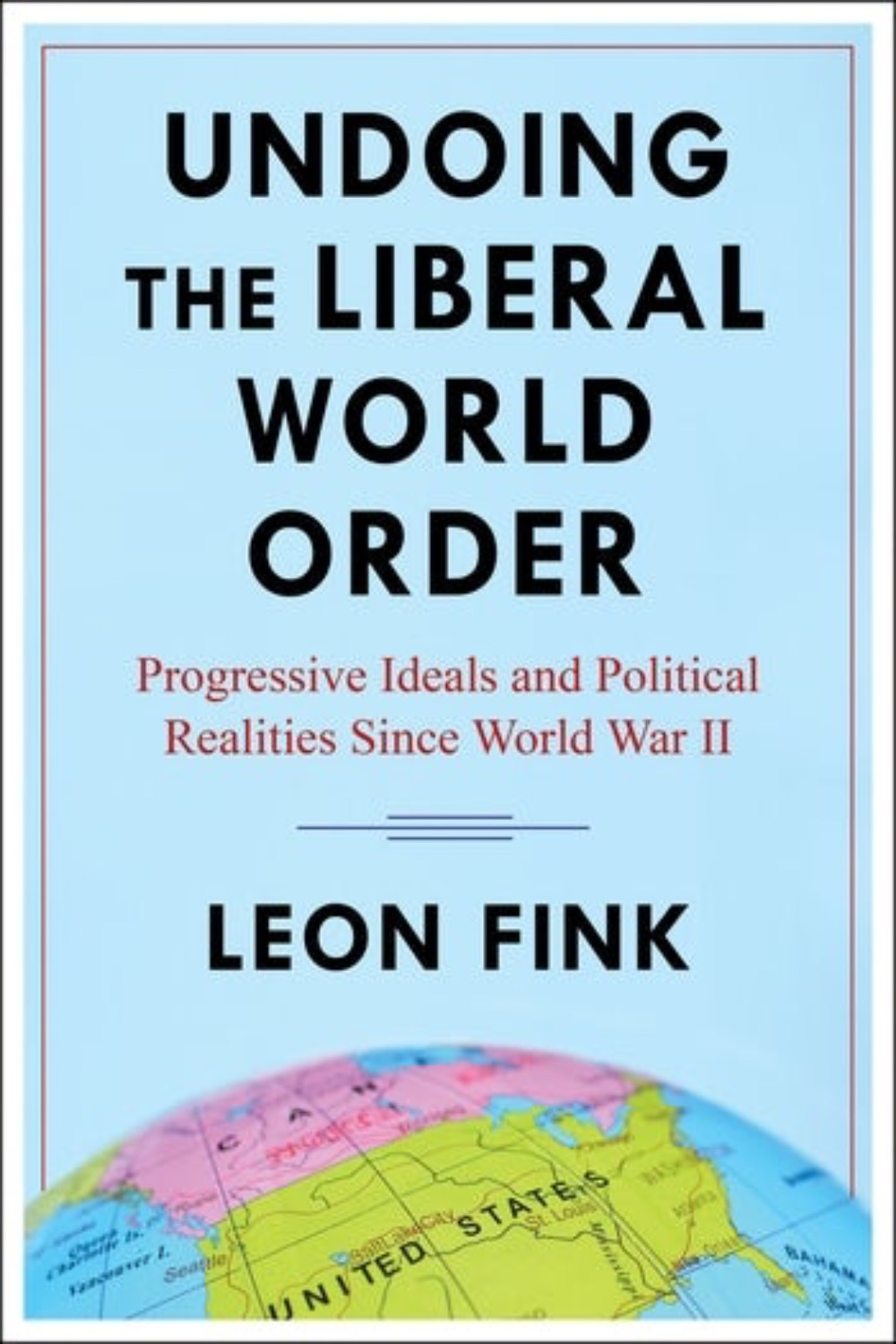The Book
Undoing the Liberal World Order: Progressive Ideals and Political Realities Since World War II
The Author(s)
Leon Fink

In the historiography of the United States, studies of the relationship between liberalism and the political arena usually focus on the domestic—on movements and parties, on public policy and electoral politics, sometimes in connection with American foreign policy. In this compelling, thought-provoking book, Leon Fink offers a quite different exploration of the concerns and projects of U.S. liberals by showing how, during the post–World War II period, they sought to promote a liberal internationalism in other countries that prized social democracy and, in its service, economic growth. If these liberals often demonstrated “ambition or determination to transform the world” (227), and if the strength of the campaign against apartheid in South Africa revealed the transformative potential of their work, more often their impact fell short of this ambition and determination. Whereas historians in many subfields have struggled to make real an interest in thinking globally, Fink richly shows the value of understanding American liberalism not only within the borders of the United States but also—during an age of U.S. engagement with the world—beyond them.
Noting that “the term ‘liberal’ has proved something of a conceptual moving target’ (17), Fink has an interest in how advocacy for social democracy, complemented by support for an activist state, which characterized the New Deal liberals at the heart of his study, was supplanted, by the late twentieth century, by a neoliberalism that arrested the pursuit of their “progressive ideals.” Although the outward-facing agenda of American organized labor is an important strand of Fink’s investigation, the “left-liberals” he studies are more diverse, including policymakers, politicians, and varied activists. Providing an encapsulation of such a vision, and exemplifying the breadth of the people under study in the book, student activists Clare and Harris Wofford, on a visit to India in 1950, wrote of a need for “a New Deal for all of mankind” (126). India is the subject of one of Fink’s case studies, also including West Germany (where the pursuit of an American liberal vision took place in tandem, and interaction, with trade unionists and policymakers of similar political concerns from the United Kingdom), Israel, and Costa Rica, as well as South Africa. The need to achieve an authoritative command of several countries’ histories is among the reasons why a globalized perspective often remains a goal unrealised among historians; in demonstrating such a command, Fink also demonstrates the value of the goal.
If growth-infused social democracy provided the intellectual context for liberals’ engagement in other countries, the means of implementation varied from place to place. In Germany, labor officials from both the UK and US played a role in fostering the post-Nazi development of unions. Meanwhile, liberal interest in Israel was not only as a refuge but also as a model for building a social democratic state in that region. Costa Rica and India were both also, against the context of varied challenges, the focus of a development agenda that sought to promote democracy and to hold the line against communism. Over time, however, these goals encountered problems; when Daniel Patrick Moynihan became ambassador of India in 1973, he interpreted programs to foster development – despite the country’s socioeconomic progress – with a neoconservative skepticism about the capacity of government to achieve positive change. Meanwhile, the concerns of this liberal internationalism were starting to undergo change. Still supportive of Israel, liberals after the Six-Day War of 1967 turned to a stress on the need for a “two-state solution.” For Fink, probably the most impactful example of liberals’ engagement overseas was the campaign against apartheid in South Africa, starting with civil rights and liberal religious groups, but developing a multifaceted movement of such wide-ranging power that the Comprehensive Anti-Apartheid Act of 1986, imposing consequential sanctions, achieved necessary support among Republicans as well as Democrats.
Despite an interest in taking on new targets, the antiapartheid movement soon lost momentum—one part of the finely crafted explanation that Fink advances for the decline of liberal internationalism. Individual projects, as Moynihan bemoaned, encountered their own problems, even alongside successes. The aftermath of the Vietnam War also encouraged a reformulation of liberal concerns. Fink connects the decline, too, to the rise of neoliberalism in the 1970s years of stagflation that more broadly placed New Deal liberalism under fatal stress; Fink notes that liberals had embraced free trade as a motor of growth, but in that later period a free-trade agenda operated against their larger interests.
Undoing the Liberal World Order is thought-provoking not only because, in offering a carefully crafted analysis of their active engagement with problems elsewhere in the world, it encourages us to understand differently American liberals of the post–World War II. It is thought-provoking, too, because an interest in how the disappointment of their internationalism created an opportunity for Donald Trump’s “populism or hypernationalism” (2). Fink asks us to consider how “left-liberalism,” with “a new jolt of ideological vigor,” might work toward “a new liberal world order” (13).
About the Reviewer
Robert Mason’s research is on the United States during the twentieth century, especially American political history of the post–World War II years. Much of my work focuses on the Republican party; I have also studied how the news media in the United States have covered politics. This reflects an interest in investigating how politicians develop an understanding of voters’ concerns and how they then formulate efforts to speak to those concerns. His first book, Richard Nixon and the Quest for a New Majority, examines how the Nixon administration reacted to the perception that liberalism’s contemporary problems created a historic opportunity for a conservative breakthrough. He is currently writing a book about Spiro T. Agnew, Richard Nixon’s first vice president. During the Nixon years Agnew achieved fame and notoriety because he promoted conservative ideas in a particularly aggressive, controversial manner.

0